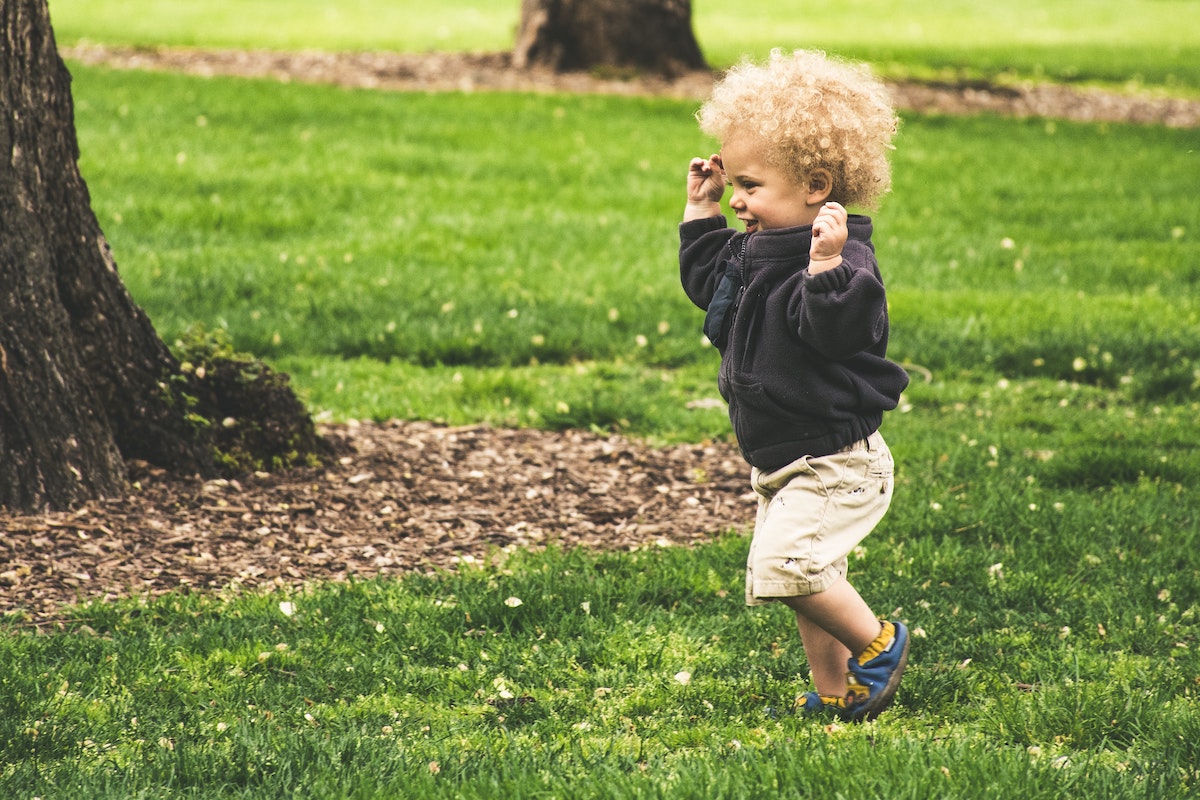When children reach toddlerhood, things seem to get very complicated. Emotions run high, everybody is exhausted, and tantrums seem neverending. This insightful article delves into valuable techniques backed by scientific research to help you navigate difficult moments with confidence. You will discover the actions and phrases to use when your toddler doesn’t listen. Get ready to unlock and adapt this valuable toolbox to your daily family routines & learn how to deal with an angry child!
Phrases To Use When Your Toddler Doesn’t Listen
In times of anger, a few carefully chosen words can work wonders in helping your child find calm within the storm. Positive things to say to your child, such as “I understand how you feel,” or “Your feelings are important,” gently reassure them that their emotions are valid. Offering encouraging words for kids, like “You have the strength to overcome this” or “I’m here to support you,” can empower them to navigate their feelings constructively.
Here are 14 specific phrases to use when your toddler doesn’t listen, that can provide comfort and guidance. Find out how to get kids to listen, step by step.
1. Set Boundaries: “We don’t shoot arrows inside the house. Let’s find something else to play with that’s safe for indoors.”
Boundaries and expectations are not universal. They come from our personal beliefs and values. For example, you can expect a visitor to take off his shoes when visiting, but you may have to verbalize that boundary before letting them in. Similarly, toddlers are constantly learning and experimenting with new situations. Parents will have to patiently create, adapt and enforce limits when their toddler doesn’t listen.
The first questions you should ask yourself are: Do they know what’s expected of them? Do they know how to use the bow and arrows? Are they aware of the consequences if something gets broken or someone gets hurt?
A lot of things make sense to us as adults. Our brain developed to distinguish right from wrong, valuable from less important, urgent from flexible, and all the nuances in between. For some reason, we forget about these things when disciplining a toddler. The first question we ask our angry child when misbehaving is, “Why did you do it?”. Sometimes, we even get mad for not getting any answer.
Be patient and wait for both of you to calm down before addressing misbehavior when your toddler doesn’t listen. Then, use a kind, soft tone to remind your child about boundaries, about why some things happen in a specific order, or give alternatives that encourage desirable behavior in the future. Not many good things can be built in a conflict state, and you probably want your effort to matter.
2. Explain the Reason Rather than Simply Giving a Command: “I am not okay with you getting wet in the rain, because I am afraid you will fall sick. Instead of, stop, don’t walk in the rain.”
The “don’t do this or that” approach might be hard for toddlers to understand. It doesn’t get kids to listen and it doesn’t help you when your toddler doesn’t listen. The reason behind it is actually very easy to grasp. Small children learn through the relationship between cause and effect. This means learning by direct experimentation. A 2 or 3-year-old’s self-control is underdeveloped. “Don’t eat the cookie!” is torture for them. Telling them to be patient falls under the same register.
What you can try is explaining the reasons why his close ones follow a set of rules. How to get kids to listen? Make limits sound like a partnership. “We don’t play with sharp objects because we can get hurt.”, “We ride our bikes on the sidewalk because the street is for the cars,” “We don’t stay out in the rain because we like to stay healthy.”
This approach will be useful when your little one sees different behavior in others. They will be able to understand that rules are not and shouldn’t even be the same for everyone and that their family is unique, just as it should be. Other people’s rules are not better or worse; they are just different. This is the message that you might want to send to your children. It’s valuable for later when peer pressure becomes a thing.
3. Give choices: “Would you like to wear the blue or red shirt today?”
It is not a contradiction. Limits come first. You can only discipline a toddler by setting clear rules, expectations, and consequences. The thing here is to start giving choices within those boundaries. It will empower children and give them a sense of control over their actions.
Take the example above when your toddler doesn’t listen. You know that you have one hour to get ready in the morning. You know that you want your child to dress according to the weather. You also want them to always wear clean clothes. These are unquestionable boundaries that you made sure to transmit to your child. However, on a given morning, they want the purple t-shirt from the laundry basket, refuse to put on a jacket, or can’t seem to decide what to wear while you’re already running late. It’s a very common scenario. The difference lies in how you respond to it.
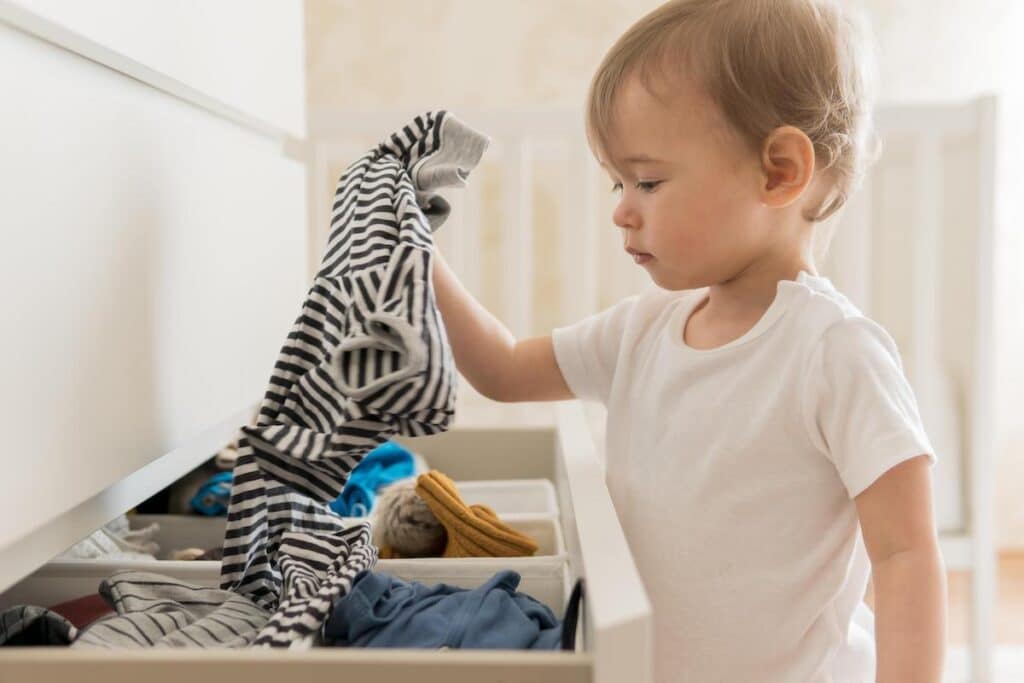
You can force your child to stick to the rules and do as you say, probably turning everything into a power struggle. Toddlers are crowned kings and queens for throwing spectacular tantrums. You know it!
Another approach is to start the morning positively from the moment they open their eyes; “Good morning, my precious child! Would you like milk or orange juice for breakfast? Do you want to brush your hair before or after you put your shoes on? Would you like to wear the blue shirt or the red one today?” It might sound like a big effort, especially when your mind is running miles to plan the rest of the day. However, with this approach, you are modeling a behavior your child might pick up as they grow older. It doesn’t have to feel unnatural, like putting on a show. Just think of what choices you are ready to allow within the boundaries you’ve set. This will satisfy their innate Need for Autonomy and make it more likely that they will cooperate.
4. Prepare your child for what’s coming next: “We have five more minutes to play before we need to leave the park.”
We’ve covered setting limits and giving choices within boundaries. Now comes predictability. Imagine that you are doing something you enjoy, something that relaxes you. Think hammock, book, and a warm breeze. Or maybe a bubble bath, relaxing music, and dim light. Unexpectedly, someone insists that you wrap everything up and be ready for a change of setting. You got the picture!
Now think of this: toddler, out in the park, playing with favorite toys, engaged in something that you could call early socialization.
Obviously, “Because I say so!”, “Hurry up!” or “If you’re not coming now, I’m leaving” are not words to calm an angry person down and get them to cooperate. You might want to refrain from using them. In fact, this attitude can be disastrous for your relationship. Although effective because it gets things moving, it should be avoided at all costs.
What you might want to try instead is to offer predictability. It’s the best way to prevent meltdowns. You know that you want to leave in 15 minutes. Share this with your toddler. If you must leave unexpectedly, consider investing a few minutes to prepare them. Maybe offer to help in gathering toys, allowing them to say bye to the other children, and let them know when you will come back to the park. It’s just so simple, and it will save you those tiring tantrums.
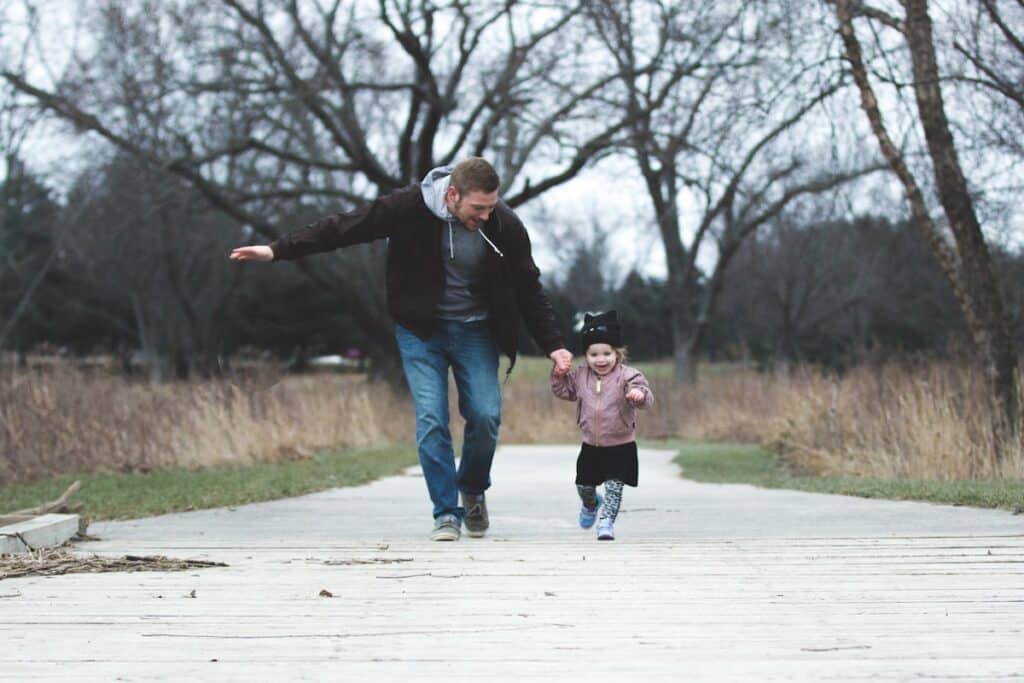
5. Be specific about consequences: “If you continue to throw your food, we will need to end the meal early.”
We’ve talked about the effectiveness of “don’t.” Small children’s prefrontal cortex, the part of the brain that manages emotions, reactions, and self-control, is fast developing at this age. Yet, it is not fully mature for your child to be able to handle impulses. This is why early years are a challenge for parents. The child seems to intentionally test every boundary, break every rule, and all those big emotions are added on top.
Let’s take a look at the example above. Your toddler is playing with food, throwing it on the floor. A parent’s thoughts might be: “Gosh, I just mopped!”, “sigh – The baby doesn’t like my food,” “I will never be able to put food in this child!”. Pick your favorite and add your thoughts. What the toddler might think: “Wow, just look at what my mom does with her face when I do this!” or “I threw that piece, and it fell on the floor. The second one fell right next to it.”
As mentioned earlier, small children learn by cause and effect. They discover new movements and interact with objects in a way that is valuable for their learning and getting new skills.
Parents can guide their children’s behavior by using clear, specific consequences. It’s important to be calm but firm. Get to their level, make eye contact, and say, “If you throw sand toward other children, we will have to go to another part of the park to play.” or “If you continue to run toward the street, I will have to pick you up or put you in the stroller until we get to a place where you can run safely.”
6. Allow the toddler to take charge of the situation: “I see you’re having trouble. Do you want to try a different way, or would you like me to show you how to do it?”
They’re small, and we want to jump to their rescue. It’s in our nature to protect, nurture, and teach our young children. However, it is beneficial to their development to practice new skills. Some parents create mini universes for their little kids. Designing furniture and putting everything at eye level and within reach for the child. In this way, children are encouraged to become independent and get good problem-solving skills.
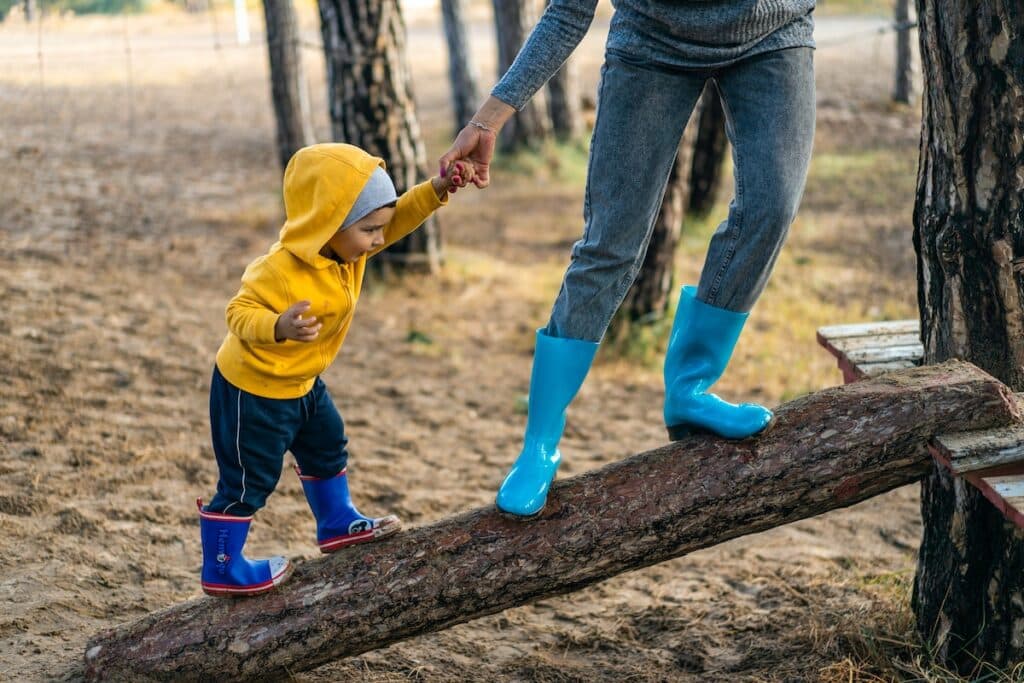
Another technique is to allow frustration to occur, as it is part of the learning process. In the end, when the skill is mastered, their inner satisfaction may weigh more than than the stress of getting to the wanted result.
See what your child wants. Some children might get frustrated when they receive help without being asked. When you see your toddler struggling, ask for permission before giving a hand. This might signal that you trust them to succeed and it will also be great for their self-esteem. Use positive reinforcement. Praise effort and help them auto-evaluate the process. “This was a very hard task, but you did it. I’m proud of you. How did you do it?”
7. Build emotional intelligence: “I’m listening, please use your words”
Toddlers are usually loud bundles of joy. They are loud when they have fun and even louder when they are angry. For the same reason mentioned above – the immature development of the prefrontal cortex – they will sometimes throw things or even try to hurt themselves or others. In their temper tantrums, you see anger in its most unprocessed form.

We all want to be heard and seen and have our opinions taken into account. Force and aggression are usually the last resort, coming from intense frustration. It’s harder to get them to cooperate and calm your toddler down when they enter this state. That is why prevention is key here.
Help them expand their emotional vocabulary, using words to appreciate a child. “You are probably frustrated now,” “I see that you struggle with your feelings”, “You look angry,” or “You seem unsatisfied.” This teaches them to externalize their feelings more positively and effectively, promoting self-expression and self-control. By nurturing their emotional intelligence and providing them with healthy coping strategies, you can learn how to deal with an angry child. You can guide them toward better anger management for kids and overall emotional well-being.
👉 Want to create a nurturing and supportive environment for your child? Dive into the article What Are the Different Parenting Styles to explore the different parenting styles and learn how they influence your child’s emotional and social development.
8. Show empathy: “I know you’re having fun playing, but it’s time to go home now. Let’s plan to come back and play again soon.”
A combo of offering predictability and listening to your child’s feelings. When you know that you are about to do something that may upset your kid, show empathy.
Everything is a big deal at that age, even if you consider it trivial. Not buying them that toy at the supermarket, not giving them sweets before mealtime, or not allowing them to bring the neighbor’s cat into the house. Anything can trigger big emotions.
Acknowledge what they are trying to do, validate their feelings, and ultimately, share your opinions and limits for the situation. You can still be firm, but make sure you start with empathy.
9. Showing that you’re considering the child’s request: “Let us add this to our wish list”
You know that giving in to any request is not an option. However, your refusals may activate a tantrum. What to do? You won’t get away with “Sorry. We have no budget for this” or another “no can do” approach.
Toddlers are at a stage where asserting their will is what drives their every move. Instead, focus on positive things to say to your child. Offer alternatives and redirect their attention to something equally exciting or engaging.
Acknowledge their desires and explain why certain things may not be possible at the moment. By using positive communication, you can navigate through these challenges and foster a better understanding with your strong-willed child.
What you can try is to show your child that you are considering their request. “You want this toy? It’s a great toy, isn’t it? Let’s see if it’s on our list now.” This is great for avoiding tantrums at the supermarket. Make a list of what you want to buy and share it with your toddler. This method can be adapted to any setting. Validate feelings, opinions, and requests first and then add limits and conditions.
10. Set expectations before engaging in a new activity: “We need to be quiet in the library so others can read.”
Let’s discuss the difference between “if” and “when.” Take the example above. The house has exploded, and toys are everywhere. Your toddler gets more and more creative in developing new ways to make the living room unrecognizable. Being tired from all that playing, they would like to watch their favorite show on TV. You want to get your living room back, and you want to involve your toddler in tidying up.
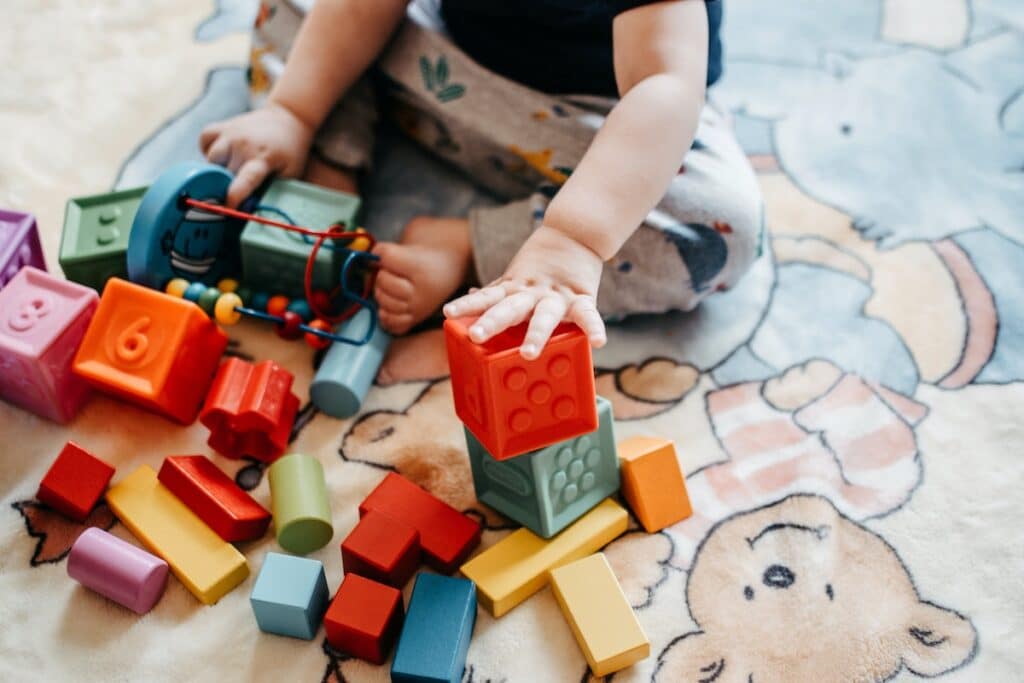
Using “if” would sound like this: “If you put away all your toys, you can watch TV.” A quick look at all the mess and hard work that needs to be put in and your child will surely want to ignore this request. It’s a tough condition. They want to watch TV now, and cleaning overlaps with their desire. Hence, using “if” might make your request less approachable than using “when.” “When” shows more flexibility. As mentioned above, it starts positively. It validates the desire and assures your child that they’ll get what they want. If you make cleaning fun and offer to help, it may be a straight path to success.
11. Redirect attention: “Let’s focus on this puzzle instead of climbing on the table.”
Your toddler is constantly learning. However, it is obvious that there are still a lot of activities and events that they weren’t exposed to yet. Take going to the library for the first time. You might get frustrated if people turn their heads in disapproval when your toddler is too loud.
That is why you should prepare them in advance. Riding a plane for the first time? Talk about seat belts, flight attendants, noises, and sensations beforehand. Going to visit new parents? Talk to your toddler about using gentle hands and a soft tone of voice around the baby. Visiting an older child who has a precious collection of trains?
Tell your child how to interact, how and what they are allowed to touch. Going to the restaurant with friends? Talk about what people might expect and how they may react, and create a plan for them to be part of the fun. Bring toys and coloring books, and set a code word for when they feel too overwhelmed and need your full attention.
12. Use “when/then” statements: “When you finish your homework, then you can watch TV.”
Even if this technique is misinterpreted, it is helpful when a toddler doesn’t listen. Attention redirection should not be used to manipulate a child. Telling a child to stop crying because people are watching or to have candy to forget about the toy they wanted from the store is not very constructive. It’s a quick fix, and we might prioritize it because it brings instant results. However, it’s not helpful in the long run. It makes children feel unsupported and unheard, and it breaks their trust. Not to mention that it becomes ineffective as the child grows.
Imagine a scenario where a child throws toys around the room at playtime. Instead of resorting to manipulation, a caregiver can gently redirect their attention to an engaging and constructive activity. For example, they might offer the child a colorful puzzle or suggest building a tower with blocks. By doing so, the caregiver is not manipulating the child but guiding their attention towards a more positive and suitable behavior.
👉If you want more information about how to create a harmonious family dynamic, explore the article Why Don’t My Kids Listen to Me. Find out actionable steps to create a more attentive and responsive environment for your children. Also, learn how to deal with an angry child.
13. Use “I” statements: “I feel frustrated when you don’t listen to me.”
Join the club of parents who are on an unrelenting quest to get their toddlers to listen and stay on good behavior. There’s something in the way they are testing us and pushing every button that makes us feel powerless.
“I” statements are great if you want to address misbehavior constructively. They are also great at building your child’s emotional vocabulary. Instead of saying, “You never listen to me!” say, “I feel frustrated when you don’t listen to me.” Toddlers are naturally empathetic. Although they might be storms on two feet, wanting to assert their will, they are also at the perfect age to understand other people’s feelings and perceptions. If you socialize your emotions honestly and openly, your kids will most likely pick up on that behavior.
14. Use humor: “Uh-oh, looks like our listening ears took a little nap! Let’s wake them up and try again.”
Some studies have shown that children can appreciate humor very early. Developing our sense of humor is closely linked to how we interact with others and the culture we grow up in. It evolved as a way for people to bond and communicate with each other.
It goes without saying that parents should introduce humor to their parenting practices. Humor makes us open up and feel safe. Think of fun, playful ways to introduce rules and start conversations with your toddler. A 2-year-old will respond better to a playful invitation than to complicated words. When parents model a happy disposition and openness, the potential to create friendly, approachable, and open-minded individuals increases.
Conclusion
When parenting toddlers, concentrate on fostering their development and creating a positive parent-child relationship. Firstly, setting boundaries is essential to provide structure and guidance. Explaining the reasons behind rules can help toddlers understand the importance of following them. Allowing toddlers to practice their skills and offering specific instructions can promote independence and learning. Finally, building emotional intelligence is crucial, as it helps toddlers recognize and manage their emotions. Think of these phrases to use when your toddler doesn’t listen: “Let’s try to understand each other’s feelings” or “What do you think would happen if we don’t follow the rule?”. This can encourage communication and design a cooperative family environment.
Ready to enhance your parenting skills and strengthen your relationship with your toddler? Enroll in our empowering parenting class today – How to Talk so Kids Will Listen: 3 Proven Methods! Discover techniques for effective anger management for kids. Learn how to foster your toddler’s independence, give clear instructions, and build their emotional intelligence. Gain valuable insights and tools to navigate challenging situations with ease – learn words to calm an angry person down, questions to ask an angry child and also useful words to appreciate a child.
References
Ajzen, I. (2002). Perceived Behavioral Control, Self-Efficacy, Locus of Control, and the Theory of Planned Behavior1. Journal of Applied Social Psychology, 32(4), 665-683. https://doi.org/10.1111/j.1559-1816.2002.tb00236.x
Allen, L.R. (2015). Transforming the Workforce for Children Birth Through Age 8: A Unifying Foundation. Child Development and Early Learning. https://www.ncbi.nlm.nih.gov/books/NBK310550/
Bleses, D., Makranky, G., Dale, P., Højen, A., & Ari, B. (2016). Early productive vocabulary predicts academic achievement 10 years later. Applied Psycholinguistics, 37(6), 1461-1476. https://doi.org/10.1017/S0142716416000060
Hoicka, E., Butcher, J., Malla, F., & Harris, P. L. (2017). Humor and preschoolers’ trust: Sensitivity to changing intentions. Journal of Experimental Child Psychology, 154, 113-130. https://doi.org/10.1016/j.jecp.2016.10.006
Innis, G. (2012). Boundaries and expectations are important parenting tools. Michigan State University Extension. https://www.canr.msu.edu/news/boundaries_and_expectations_are_important_parenting_tools
Koestner, R., Ryan, R. M., Bernieri, F., & Holt, K. (1984). Setting limits on children’s behavior: The differential effects of controlling vs. informational styles on intrinsic motivation and creativity. Journal of Personality, 52(3), 233-248. https://doi.org/10.1111/j.1467-6494.1984.tb00879.x
Levy, J., Goldstein, A., & Feldman, R. (2019). The neural development of empathy is sensitive to caregiving and early trauma. Nature Communications, 10(1), 1-10. https://doi.org/10.1038/s41467-019-09927-y
Meltzoff, A. N., Waismeyer, A., & Gopnik, A. (2012). Learning About Causes From People: Observational Causal Learning in 24-Month-Old Infants. Developmental psychology, 48(5), 1215. https://doi.org/10.1037/a0027440
Ornaghi, V., Conte, E., & Grazzani, I. (2020). Empathy in Toddlers: The Role of Emotion Regulation, Language Ability, and Maternal Emotion Socialization Style. Frontiers in Psychology, 11. https://doi.org/10.3389/fpsyg.2020.586862
Shrier, C. (2017). The importance of talking to your children. Michigan State University Extension. https://www.canr.msu.edu/news/the_importance_of_talking_to_your_children
Simon, P. (2021). Preschoolers’ Empathy Profiles and Their Social Adjustment. Frontiers in Psychology, 12. https://doi.org/10.3389/fpsyg.2021.782500
Weisleder, A., & Fernald, A. (2013). Talking to children matters: Early language experience strengthens processing and builds vocabulary. Psychological science, 24(11), 2143. https://doi.org/10.1177/0956797613488145

